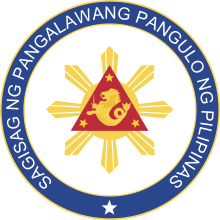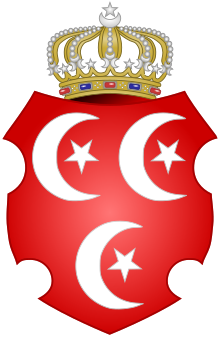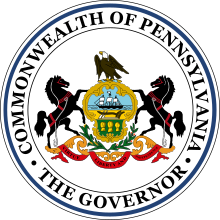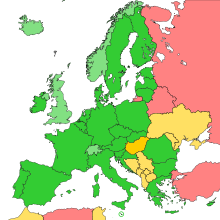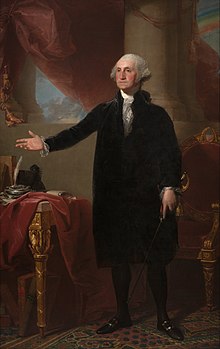Portal:Politics
| Main | Topics and categories | Tasks and projects |
The Politics portal
Politics (from Ancient Greek πολιτικά (politiká) 'affairs of the cities') is the set of activities that are associated with making decisions in groups, or other forms of power relations among individuals, such as the distribution of resources or status. The branch of social science that studies politics and government is referred to as political science.
It may be used positively in the context of a "political solution" which is compromising and non-violent, or descriptively as "the art or science of government", but also often carries a negative connotation. The concept has been defined in various ways, and different approaches have fundamentally differing views on whether it should be used extensively or in a limited way, empirically or normatively, and on whether conflict or co-operation is more essential to it.
A variety of methods are deployed in politics, which include promoting one's own political views among people, negotiation with other political subjects, making laws, and exercising internal and external force, including warfare against adversaries. Politics is exercised on a wide range of social levels, from clans and tribes of traditional societies, through modern local governments, companies and institutions up to sovereign states, to the international level.
In modern nation states, people often form political parties to represent their ideas. Members of a party often agree to take the same position on many issues and agree to support the same changes to law and the same leaders. An election is usually a competition between different parties.
A political system is a framework which defines acceptable political methods within a society. The history of political thought can be traced back to early antiquity, with seminal works such as Plato's Republic, Aristotle's Politics, Confucius's political manuscripts and Chanakya's Arthashastra. (Full article...)
Selected article
The Liberal Movement was a minor South Australian political party in the 1970s. Stemming from discontent within the ranks of the Liberal and Country League, it was organised in 1972 by former premier Steele Hall as an internal group in response to a perceived resistance to sought reform within its parent. A year later, when tensions heightened between the LCL's conservative wing and the LM, it was established in its own right as a progressive liberal party. When still part of the league, it had eleven parliamentarians; on its own, it was reduced to three. In the federal election of 1974, it succeeded in having Hall elected to the Australian Senate with a primary vote of 10 per cent in South Australia. It built upon this in the 1975 state election, gaining almost a fifth of the total vote and an additional member. However, the non-Labor parties narrowly failed to dislodge the incumbent Dunstan Labor government. That result, together with internal weaknesses, led in 1976 to the LM's being re-absorbed into the LCL, which by then had become the South Australian division of the Liberal Party of Australia. The LM and its successor parties gave voice to what is termed "small-l liberalism" in Australia.
Featured picture

Annkathrin Kammeyer (born 1990) is a German Social Democratic politician. She became a Member of the Hamburg Parliament on 7 March 2011, the youngest person ever elected to that body.
Selected quote
Selected biography
Cleopatra VII Thea Philopator (Koinē Greek: Κλεοπάτρα Θεά Φιλοπάτωρ lit. Cleopatra "father-loving goddess"; 70/69 BC – 10 August 30 BC) was Queen of the Ptolemaic Kingdom of Egypt from 51 to 30 BC, and its last active ruler. A member of the Ptolemaic dynasty, she was a descendant of its founder Ptolemy I Soter, a Macedonian Greek general and companion of Alexander the Great. After the death of Cleopatra, Egypt became a province of the Roman Empire, marking the end of the last Hellenistic-period state in the Mediterranean and of the age that had lasted since the reign of Alexander (336–323 BC). Her first language was Koine Greek, and she was the only known Ptolemaic ruler to learn the Egyptian language.
Did you know (auto-generated) -

- ... that Disney once created a political advertisement for Dwight D. Eisenhower (featured)?
- ... that a priest refused to perform the wedding ceremony for Austrian socialist Josef Peskoller and his fiancée Maria Griel on political grounds in 1928?
- ... that Crossing a Line compares Palestinian political expression on either side of the Green Line between Israel and the occupied Palestinian territories?
- ... that Nobel laureate Thomas Mann reportedly did not want his Reflections of a Nonpolitical Man to be translated into English during his lifetime due to its chauvinistic content?
- ... that even though the Legislative Assembly of Quebec ordered a monument of Maurice Duplessis in front of its building, later premiers hid it for 16 years to avoid political tensions?
- ... that Jonathan Allen left journalism for politics before quitting 40 days later?
More did you know...
- ...that the 2010 Bihar legislative assembly election takes place across six phases and over one month?
- ...that politicians discuss the ways in which they and their families have suffered because of Oprahization?
- ...that Democratic and Republican plans for the 2012 United States federal budget both focus on deficit reduction, but differ in their changes to taxation, entitlement programs, and research funding?
- ...that Conservative Party candidate Bernard Trottier won a seat in the 41st Canadian Parliament by defeating the incumbent Leader of the Liberal Party of Canada in the 2011 federal election?
- ...that the New Zealand McGillicuddy Serious Party wanted to return to a medieval lifestyle and establish a monarchy based on the Scottish Jacobite line?
- ...that when the Tennessee Center for Policy Research, a "free-market think tank," criticized Al Gore's energy use, CNN mistakenly called the organization an environmental group?
In this month
- May 5, 2005 – A General Election in the United Kingdom sees Tony Blair's Labour government returned to office with a reduced majority of 66.
- May 14, 1948 – The Declaration of Independence of Israel is made.
- May 18, 1948 – The first Legislative Yuan of the Republic of China officially convenes in Nanking.
News and Current events
- August 11: 4 local government areas in New South Wales, Australia locked down after COVID-19 case
- August 11: Australia: AstraZeneca vaccine access expanded by Victorian government
- August 1: Australia: Victorian lockdown lifted
- July 29: Tunisia's president dismisses prime minister, suspends parliament
- July 25: Australia: Wikinews interviews Reg Kidd, mayor of the City of Orange, about COVID-19 lockdown and local government
- July 23: South Australia enters week-long lockdown to contain COVID-19 Delta variant spread
- July 21: Technological University Dublin senior lecturer Dr Lorcan Sirr speaks to Wikinews on housing market in Ireland
- July 21: Three rural councils in New South Wales, Australia enter 7-day lockdown
- July 21: Australia: Victoria lockdown extended by a week with 85 active cases recorded
- July 15: California governor signs new state budget, eligible Californians to get stimulus payments
Topics and categories
General images
Related portals
Associated Wikimedia
The following Wikimedia Foundation sister projects provide more on this subject:
-
Commons
Free media repository -
Wikibooks
Free textbooks and manuals -
Wikidata
Free knowledge base -
Wikinews
Free-content news -
Wikiquote
Collection of quotations -
Wikisource
Free-content library -
Wikiversity
Free learning tools -
Wiktionary
Dictionary and thesaurus




